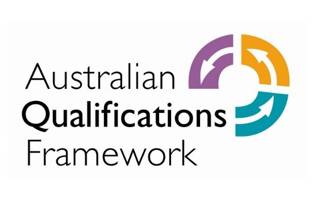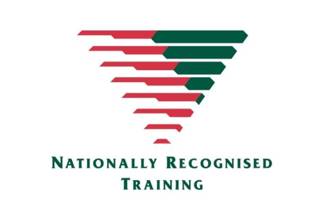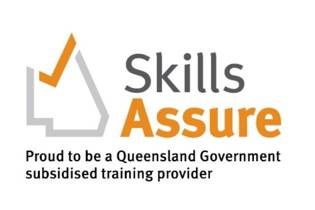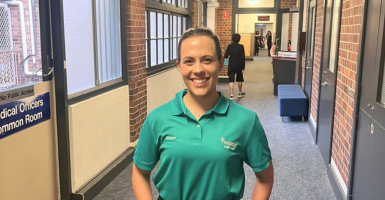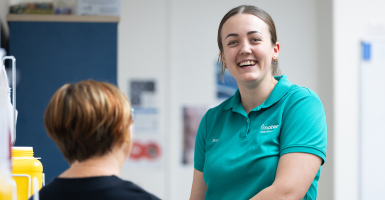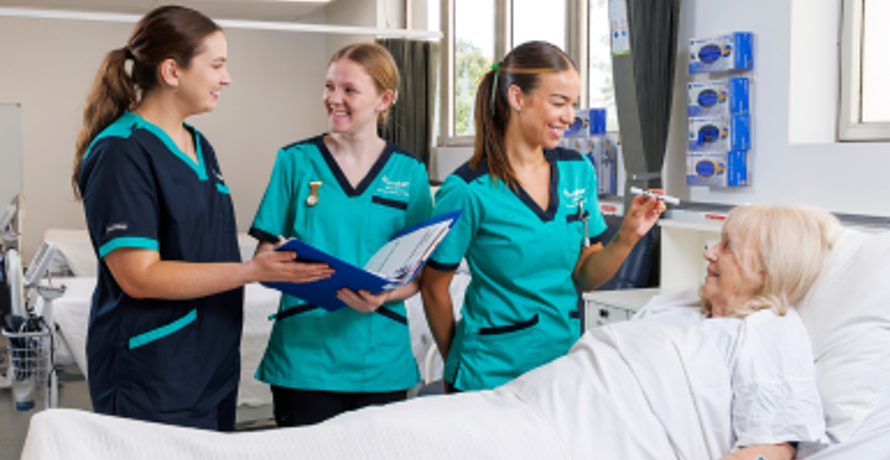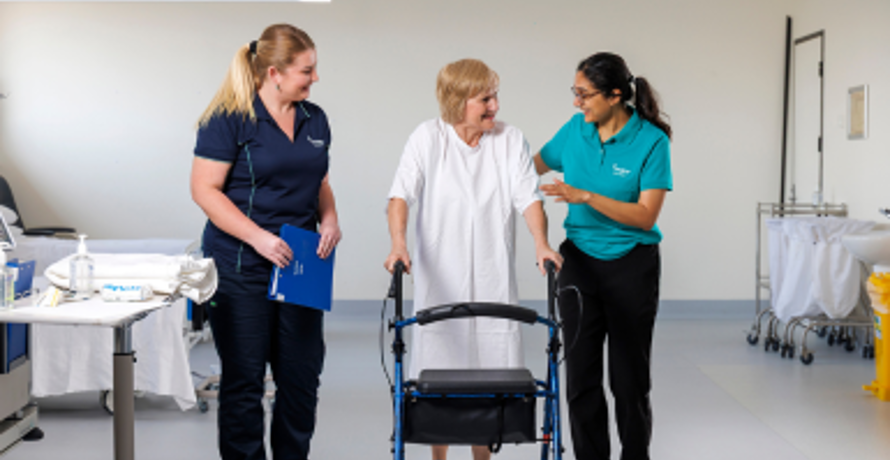Certificate III in Pathology Collection
HLT37215
 Our Certificate III in Pathology Collection course will arm you with the skills, knowledge and practical experience you need to become a pathology specimen collector (phlebotomist) in just 15 weeks plus placement.
Our Certificate III in Pathology Collection course will arm you with the skills, knowledge and practical experience you need to become a pathology specimen collector (phlebotomist) in just 15 weeks plus placement.
Get hands-on, hospital-based training at Mater Hospital Brisbane or Mater Health Hub, Springfield.
Be supported by our expert educators and gain the knowledge, skills and practical experience you need to kickstart your rewarding career in pathology collection.
This qualification is approved for the Career Start program under the General Training Pathway. For more information on the available funding options and criteria go to the Costs section on this page. Eligibility criteria apply.
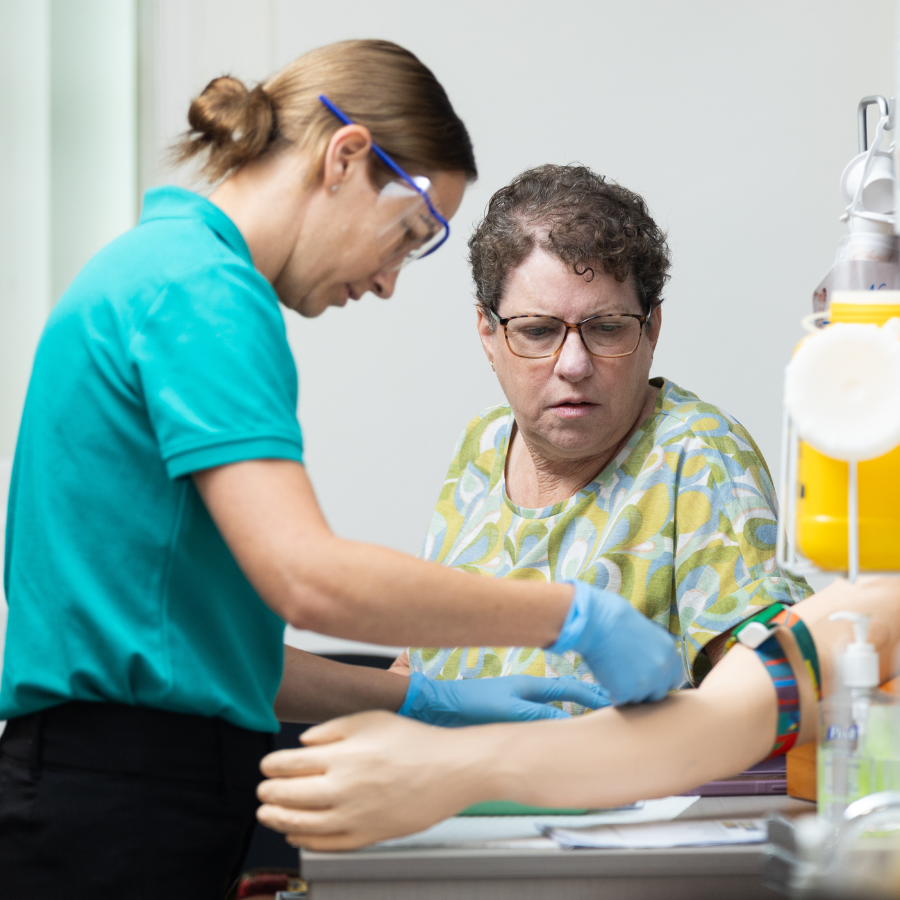
You will learn:
- How to collect blood specimens by venepuncture
- How to collect pathology specimens other than blood
- Procedures for handling and transporting pathology specimens
- Infection control policies and procedures - including standard additional precautions
- How to effectively communicate in the workplace
- How to identify and respond to clinical risks
- Quality assurance practices
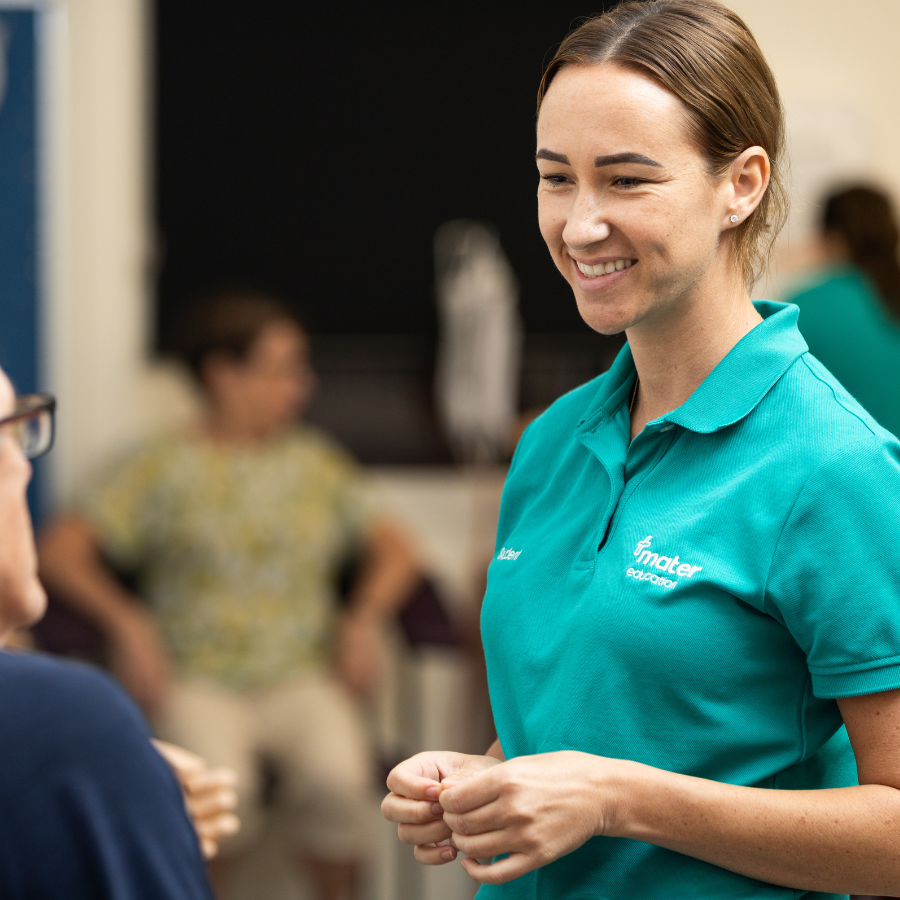
Career pathways
After completing the course, you will be qualified to work in a variety of healthcare collection settings such as:
- pathology collection centres
- hospitals
- medical practices
- in a patient’s home
- or for medical research.
A career in phlebotomy requires considerable technical expertise and strong interpersonal skills.
Course information
-
Mater Education wants students to have every opportunity to succeed at their study. Our program is dynamic and delivered in a way that caters to all learning styles.
When applications are open, you will need to complete an online application addressing the following four criteria:
- What motivates you to pursue a career in healthcare at this time?
- Why do you think the Mater Education program would suit you?
- How do you plan to balance your life, work and full-time study commitments?
- List your previous working history.
Applicants will need to:
- Be 17 years of age or older.
- display competence at or above Exit Level 2 in the Australian Core Skills Framework (ACSF) across all five core skills of learning, reading, writing, oral communication and numeracy. You will also be required to demonstrate sufficient digital literacy. Check your digital literacy skills before applying.
- agree to obtaining a criminal history check prior to workplace experience placement.
- be immunised, or in the process of being vaccinated, for the following communicable diseases:
- Hepatitis B
- Varicella (chicken pox)
- MMR (measles, mumps and rubella)
- Pertussis (whooping cough)
- Seasonal vaccinations (influenza) as required.
- have access to a reliable internet connection enabling access to Mater Education’s virtual learning environment, and a portable digital device with up-to-date software, including Microsoft Office, Adobe Acrobat Reader and Adobe Flash Player to utilise in class and at home to complete assessments and online activities.
-
Career Start – General Training Pathway
Career Start is one of the Queensland Government’s core funded vocational education and training (VET) programs managed by the Department of Trade, Employment and Training (DTET).
Eligibility
Under Career Start, you may access up to two funded training places through one of the following options:
- a qualification in a certificate III under the general training pathway and an apprenticeship or traineeship. If the apprenticeship or traineeship is completed first, you are not eligible to access a general training pathway qualification under Career Start.
- two apprenticeships and traineeships in either a certificate II or III (school-based apprenticeships and traineeships are included in this total).
Note: Students who successfully complete this qualification under the General Training Pathway will no longer be entitled to access a subsidised training place.
General Training Pathway
To be eligible, you must:
Non-concessional student Co-Contribution — $994
- be aged 15 years or older, and no longer in school
- permanently live in Queensland;
- be an Australian or New Zealand citizen, Australian permanent resident (includes humanitarian entrants), or a temporary resident with an eligible visa subclass
- not already have a certificate III or higher qualification completed within the last 10 years (qualifications completed as a school student, and foundation skills qualifications don't count)
- not be enrolled in another qualification, even if it's on hold or deferred, whether funded by Department of Trade, Employment and Training or not (foundation skills qualification don't count).
Concessional student Co-Contribution — $756
All of the above plus:
- hold a Health Care, Veteran, or Pensioner Concession Card, or are the partner or dependent of someone with such a card and are named on the card;
- have a Commonwealth form confirming eligibility for concessions under a Health Care, Veteran, or Pensioner Concession Card;
- identify as Aboriginal or Torres Strait Islander (First Nations people);
- have a disability
Full Fee-paying student - $4,990
If you are not eligible for a subsidy, Mater Education offers payment plans.
To pay your fees this way you’ll need to make non-refundable payments—the first before the start of the course. There are no administration fees or interest charges, and no extra charges for credit card payments. Please contact us for more information.
Co-contribution and refund information is available on our policies page.
Additional costs
As part of your enrolment, you will need:
- Mater Education uniform shirt (~$60 - $80 per shirt)
- Closed-in black leather shoes
- Black business pants or knee-length black skirt (preferably with pockets) with stockings
- Criminal history check (~$30)
- Any additional vaccinations you may require
- Microsoft compatible electronic device and internet access
Students are to apply for credit prior to course commencement for previously completed units of competency. Where evidence of credit transfer is not provided prior to commencement of the course, tuition fees will apply.
-
This course is delivered over 15 weeks plus a minimum of 35 hours placement. Classes are delivered through blended delivery, including:
- Campus: Onsite at Mater Education campus (up to two days per week).
- Online: Theory sessions and tutorials delivered online (est. 10 hours per week).
Within these modes, a range of class styles are utilised, including classroom work, group discussions, tutorials, online videos, online sessions and practical simulation events. Students will also need to participate in self-directed learning (take responsibility for your own learning journey outside scheduled training sessions).
Training times
- The Mater Education delivers classes between the hours of 8am and 3.30pm.
- Classes are typically between Monday to Friday.
Class timetables
View the indicative timetables and study expectations for students commencing study in:
-
This qualification comprises 14 units in total, including 9 core units and 6 elective units.
Core units
CHCCOM005 Communicate and work in the health or community services
This unit describes the skills and knowledge required to communicate effectively with clients, colleagues, management and other industry providers.BSBMED301 Interpret and apply medical terminology appropriately
This unit describes the skills and knowledge required to understand and respond to instructions; to carry out routine tasks and communicate with a range of internal/external clients in a medical environment; as well as use appropriate medical terminology.CHCDIV001 Work with diverse people
This unit describes the skills and knowledge required to work respectfully with people from diverse social and cultural groups and situations, including Aboriginal and/or Torres Strait Islander people.HLTINF006 Apply basic principles and practices of infection prevention and control
This unit describes the skills and knowledge required to follow organisational infection prevention and control procedures, including implementing standard and transmission-based precautions and responding to infection risks.HLTWHS001 Participate in Workplace health and safety
This unit describes the skills and knowledge required for workers to participate in safe work practices to ensure their own health and safety, and that of others.BSBCUS201 Deliver a service to customers
This unit describes the skills and knowledge required to deliver all aspects of customer service at an introductory level. It includes creating a relationship with customers, identifying their needs, delivering services or products and processing customer feedback.HLTPAT001 Identify and respond to clinical risks in pathology collection
This unit describes the skills and knowledge required to recognise client risk factors, identify emergency situations and provide emergency or first aid response to client reactions associated with pathology specimen collection.HLTPAT002 Perform venous blood collections
This unit describes the skills and knowledge required to confirm collection requirements, prepare client and equipment, and perform routine blood collections using venous blood collection.HLTPAT004 Collect pathology specimens other than blood
This unit describes the skills and knowledge required to confirm collection requirements, prepare client and equipment and make routine pathology specimen collections.Electives
HLTPAT006 Receive, prepare and dispatch pathology specimens
This unit describes the skills and knowledge required to receive specimens, complete the administrative process to prepare samples for pathology testing, and dispatch specimens. This unit does not cover the dispatch of dangerous goods or the transport of specimens to external facilities.HLTAID011 Provide First Aid
This unit describes the skills and knowledge required to provide a first aid response to a casualty in line with first aid guidelines determined by the Australian Resuscitation Council (ARC) and other Australian national peak clinical bodies.HLTAAP001 Recognise healthy body systems
This unit provides the basic level of knowledge of anatomy and physiology needed to recognise healthy body systemsCHCCCS020 Respond effectively to behaviours of concern
This unit describes the skills and knowledge required to work cooperatively with others and deal effectively with issues, problems and conflict.BSBPEF301 Organise personal work priorities and development
This unit describes the skills and knowledge required to organise personal work schedules, to monitor and obtain feedback on work performance and to maintain required levels of competence.Should you leave the course before you complete it, you’ll receive a Statement of Attainment for any units of competency you’ve successfully completed and where fees have been paid in full.
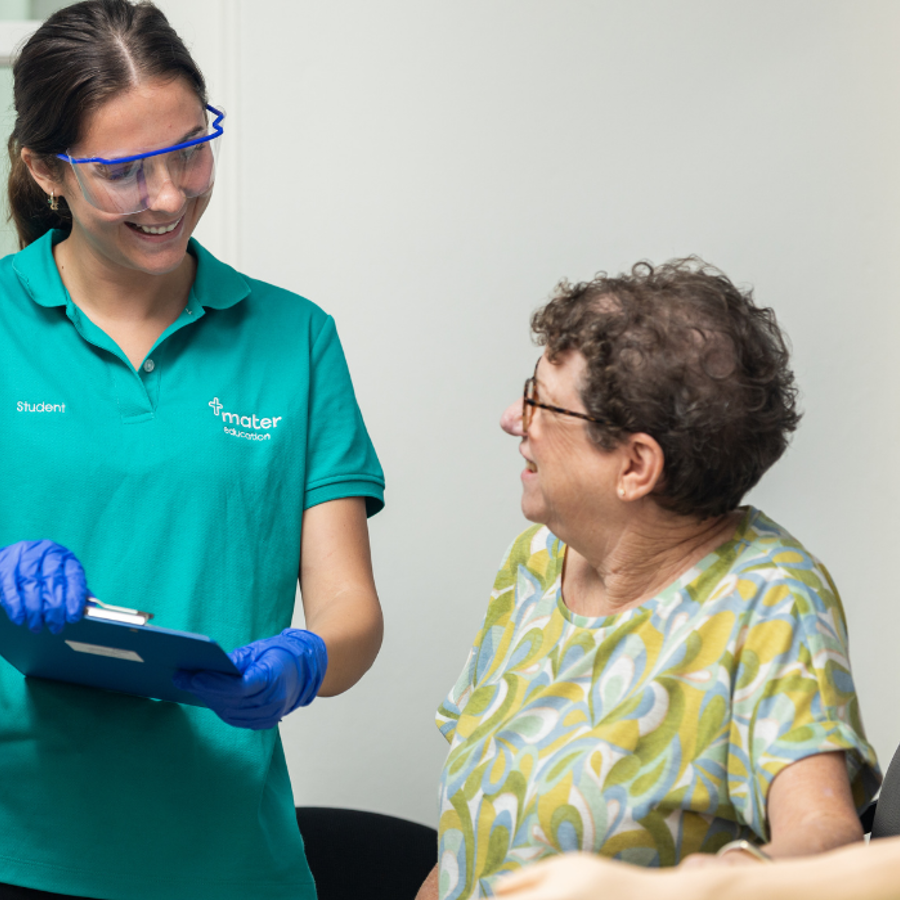
Placement
Mater Education has a dedicated placement team who will plan for your mandatory placement at major pathology providers such as Mater Pathology.
You will complete a minimum of 35 hours of workplace experience placement at the end of your studies. Placement hours are generally achieved in a fortnight.
Find out more about this course
Related courses
-
 Multiple locations18 months
Multiple locations18 monthsDiploma of Nursing
Gain the skills and knowledge you need to become an Enrolled Nurse (EN) with Mater Education’s Diploma of Nursing program.
-
 Brisbane15 weeks plus placement
Brisbane15 weeks plus placementCertificate III in Health Services Assistance
Gain the knowledge and skills you need to help health professionals take care of clients in various roles with our Certificate III in Health Services Assistance.
